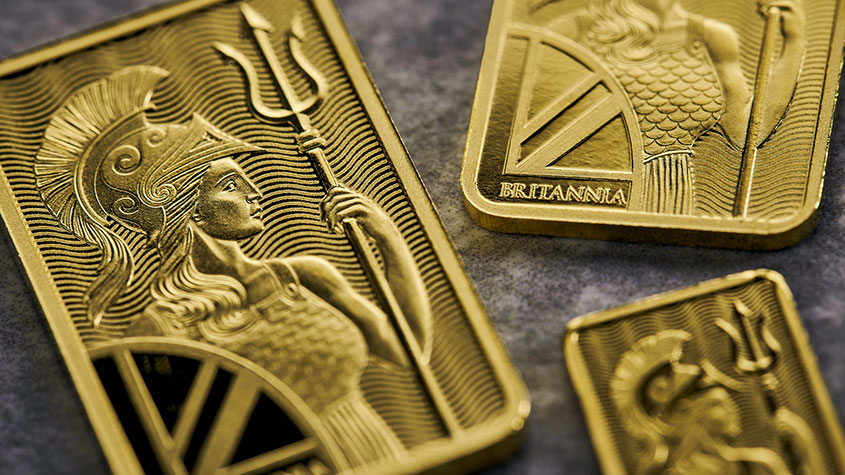Gold is now in a bear market – is it time to sell?
With its price now more than 20% below its 2011 peak, gold is now in a bear market. Does this spell the end of the long-term bull run? John Stepek investigates.

Get the latest financial news, insights and expert analysis from our award-winning MoneyWeek team, to help you understand what really matters when it comes to your finances.
You are now subscribed
Your newsletter sign-up was successful
Want to add more newsletters?

Twice daily
MoneyWeek
Get the latest financial news, insights and expert analysis from our award-winning MoneyWeek team, to help you understand what really matters when it comes to your finances.

Four times a week
Look After My Bills
Sign up to our free money-saving newsletter, filled with the latest news and expert advice to help you find the best tips and deals for managing your bills. Start saving today!
It's been a terrible few days for gold.
On Friday, the yellow metal collapsed down through the $1,500 an ounce mark. And in this morning's trading, it fell as far as $1,425 at one point.
The price has now fallen by more than 20% from its September 2011 peak of around $1,920. That means that gold is now in a bear market.
MoneyWeek
Subscribe to MoneyWeek today and get your first six magazine issues absolutely FREE

Sign up to Money Morning
Don't miss the latest investment and personal finances news, market analysis, plus money-saving tips with our free twice-daily newsletter
Don't miss the latest investment and personal finances news, market analysis, plus money-saving tips with our free twice-daily newsletter
For a while, we've been saying that you should hold around 10% of your portfolio in gold as insurance against a wobbly financial system.
So has gold outlived its usefulness? Is it time to ditch your insurance policy?
I don't think so. Here's why
Are Japanese government bonds behind the collapse in gold?
When gold suffers a brutal collapse, the conspiracy theorists rush out of the woodwork, muttering darkly about "price suppression". Ignore them. It's not good for the blood pressure and it doesn't help matters.
A number of factors have hit gold in recent days. For one, sentiment among investment banks has started turning bearish. Socit Gnrale issued a sell' note on gold recently, while Goldman Sachs went as far as to recommend shorting it. Good timing on their part as ever.
But it's not just gold. Commodities as a whole have been suffering. The oil price has taken a dive over the last couple of sessions. Copper is at an eight-month low. One slightly technical theory, cited by the Zero Hedge website, is that this general plunge is linked to the Japanese government's money-printing plans.
Since the new central bank governor, Helicopter' Haruhiko Kuroda promised to re-inflate the Japanese economy, Japanese government bonds (JGBs) have been on a wild ride.
If Kuroda is true to his word, then the current miniscule yield on JGBs (around 0.6%) is unjustified. It has to rise (and so bond prices have to fall).
At the same time however, if the central bank is planning to snap up JGBs, then why would you sell them? You've got a guaranteed buyer willing to chase prices higher (as has happened in the US and the UK).
So, even as some flee JGBs, others are keen to buy in. And as a result, JGBs have become much more volatile in other words, the price has fluctuated a lot more than normal.
When the price of an asset becomes more volatile, anyone using borrowed money to invest in them, has to put a bigger deposit (also known as margin') down. If you've ever used spread betting, you'll know how this works.
If you haven't, the margin' is there so that if your bet moves into a losing position, the person who loaned you the money to speculate won't be out of pocket. It's just like a bank asking you to put a 20% deposit down on a property. The deposit protects the bank if prices fall.
So, anyone holding JGBs is being asked to put up a bigger margin to do so. That means they need to raise the money from somewhere. That somewhere' includes taking profits on gold and other commodity holdings.
It's a theory at least. And if you're looking for something to explain the last couple of days' sell off, it's one of the more interesting ones.
Gold as a measure of faith
But I think there's a better way to explain gold's recent lacklustre performance.
It's no coincidence that gold has sold off in the wake of Japan's promise to "do what it takes" to revive its deflating economy. But it's not really about the margin calls'. It's about faith in central banks.
We've always seen gold as a form of insurance against financial calamity. At the start of this century, that insurance was cheap, because everyone believed that nothing could go wrong. After all, Alan Greenspan, the Maestro', was in charge of the Federal Reserve, and by extension, global investment markets.
Gold's rise coincided with investors gradually losing faith in the ability of central banks to keep a lid on inflation and the credit bubble. And when the financial system froze up in 2008, gold was among the first assets to bounce back.
But since then, investors have been well-trained by the Federal Reserve, and to a lesser extent, the Bank of England. When a central bank prints money, the price of stocks goes up. You don't need to worry about anything else. Just buy shares and the central banks will take care of the rest.
So what's really hurt gold is the return of faith in central bankers. Think about it. When gold hit a peak in September 2011, that was just before Mario Draghi took charge at the European Central Bank.
He was taking over from Jean-Claude Trichet, a man who had entirely lost the confidence of investors. Since then, Draghi has promised to "do what it takes" to save the euro. He's seen as a safe, market-friendly pair of hands.
And now even the Bank of Japan has seen the light. So why would you hold on to gold? The central bankers have it covered. Everything's going to be fine. So get out of boring, old gold and go buy some riskier assets.
Why you should still be insuring against financial disaster
We've been saying for some time that you should treat gold as insurance, and have no more than 10% of your portfolio invested in the metal. So is it still worth hanging on to this insurance?
I can see gold going lower from here. I'm no technical analyst, but you don't have to be to look at the gold price chart and say: "That's ugly."
However, the answer has to be "yes I'm holding on to gold". Here's why.
I'm happy to have money invested in equity markets just now. In terms of exposure to general markets, I'd hold Japanese and eurozone funds or trackers. I think they're cheap, and they'll keep going up.
In developed markets like the US and UK, I feel the overall indices are expensive (in the US) or imbalanced (the UK). I'd prefer a portfolio of individual stocks that pay an income and give exposure to the US dollar.
In any case, I think it's a good idea to have your money invested in markets rather than sitting under your bed.
But would I feel comfortable having a portfolio without any gold in it? No.
Central bankers might have won back the confidence of investors for now. The central bank put' - where investors bet that central banks will bail them out, no matter what is being wedged back in place. Central banks may even have won the war on deflation.
But make no mistake, current monetary conditions are unprecedented. Interest rates have never been this low. The Bank of England owns about a third of all outstanding UK government debt. The Federal Reserve holds about 10% of US debt.
How does all of this unwind? I don't know. No one does. But I can imagine it might get messy. Just look at the JGB market: despite Bank of Japan assurances, it's acting like a bucking bronco just now, which just shows that central banks can't control everything.
In short, I'm happy to ride markets higher via the stocks and indices we've been endlessly suggesting over the past few years. But I also want to be holding some gold, just to be on the safe side. We'll be looking at the yellow metal in more detail in the next issue of MoneyWeek magazine, out on Friday.
Follow John on Twitter || Google+ John Stepek
This article is taken from the free investment email Money Morning. Sign up to Money Morning here .
Our recommended articles for today
This is one of my favourite funds
Utility stocks offer a great way to protect your wealth from the ravages of inflation. That's why you should consider adding this great fund to your portfolio, says Bengt Saelensminde.
Prepare for Japan's coming shares boom
SUBSCRIBERS ONLY
A radical new approach to quantitative easing will give Japanese stocks a big boost, says James Ferguson. Here, he explains why, and tips the best Japanese shares to add to your portfolio.
Get the latest financial news, insights and expert analysis from our award-winning MoneyWeek team, to help you understand what really matters when it comes to your finances.

-
 Should you buy an active ETF?
Should you buy an active ETF?ETFs are often mischaracterised as passive products, but they can be a convenient way to add active management to your portfolio
-
 Power up your pension before 5 April – easy ways to save before the tax year end
Power up your pension before 5 April – easy ways to save before the tax year endWith the end of the tax year looming, pension savers currently have a window to review and maximise what’s going into their retirement funds – we look at how
-
 Diagnosing cancer more deftly will pay dividends
Diagnosing cancer more deftly will pay dividendsGiven that 50% of Britons will develop cancer during their lifetimes, we need to get better at detecting it, says Matthew Partridge. These firms are leading the technological charge.
-
 Protect against inflation with Britannia gold coins and bars
Protect against inflation with Britannia gold coins and barsAdvertisement Feature With UK inflation at a 40-year high and expected to rise even higher, interest in physical gold is surging once again. And The Royal Mint’s Britannia gold coins and bars offer an accessible and affordable way to buy.
-
 Commodity prices are taking a breather
Commodity prices are taking a breatherNews Commodity prices have fallen back after spiking early in the year. Iron ore is down 36% from its March peak, while copper has lost 20% since 1 January. And there could be further falls to come.
-
 Seoul attempts to close the “Korea discount” for stocks
Seoul attempts to close the “Korea discount” for stocksNews South Korean stocks suffer from the “Korea discount” – with the country still classified as an emerging market, investors are reluctant to pay a premium.
-
 Upcoming IPOs in 2022: which companies are planning to list this year?
Upcoming IPOs in 2022: which companies are planning to list this year?News Rupert Hargreaves explains what an IPO is, how public and private companies differ, and picks out some of the more notable companies set to list on the stock exchange this year.
-
 Five dividend stocks to beat inflation
Five dividend stocks to beat inflationTips Rupert Hargreaves looks at five stocks to beat inflation that should help protect your wealth
-
 Metals prices wobble on slowdown fears
Metals prices wobble on slowdown fearsNews The S&P GSCI index of 24 major raw materials has fallen back 9% since mid-June on growing fears of a recession, and copper has hit a 16-month low after losing 22% since a peak in early March.
-
 How to invest in the copper boom
How to invest in the copper boomTips The price of copper has slipped recently. But that’s temporary – the long-term outlook is very bullish, says Dominic Frisby. Here, he explains the best ways to invest in copper.